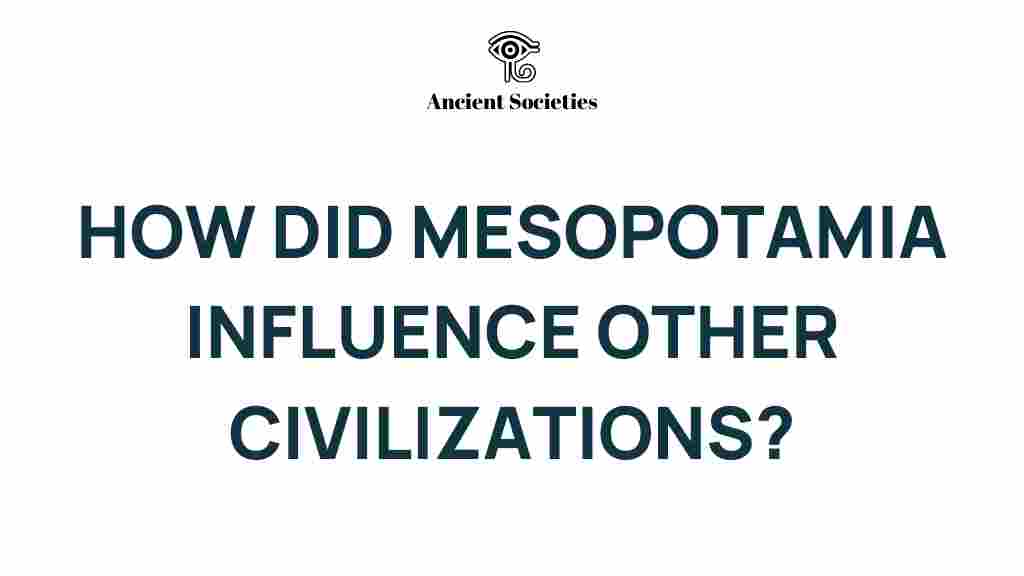Unveiling the Legacy: How Mesopotamia Shaped Civilizations
Mesopotamia, often referred to as the “Cradle of Civilization,” is a region rich in history and culture that has profoundly influenced the development of societies around the world. Nestled between the Tigris and Euphrates rivers, this ancient land is where some of the earliest human civilizations emerged. The innovations, societal structures, and cultural practices established in Mesopotamia laid the groundwork for future civilizations and continue to resonate in modern society. In this article, we will explore the remarkable legacy of Mesopotamia and its enduring influence on civilization, history, and culture.
The Birthplace of Civilization
Mesopotamia is often credited as the birthplace of civilization due to its early advancements in agriculture, writing, and urbanization. The fertile land between the Tigris and Euphrates rivers allowed for the development of agriculture, which enabled communities to flourish.
- Agriculture: The domestication of plants and animals led to surplus food production.
- Urbanization: The establishment of cities such as Uruk and Babylon marked a shift from nomadic lifestyles to settled communities.
- Writing: The invention of cuneiform writing facilitated record-keeping and communication.
These innovations were pivotal in transforming human society, allowing for complex political structures and cultural developments.
The Influence of Mesopotamian Societies
Several key civilizations arose in Mesopotamia, each contributing to the rich tapestry of its history:
- Sumerians: Known for their early city-states, the Sumerians were pioneers in various fields, including mathematics and astronomy.
- Akkadians: The Akkadian Empire, established by Sargon, was the first to unite the region under a single rule.
- Babylonians: The Code of Hammurabi, one of the earliest written legal codes, emerged from Babylonian society.
- Assyrians: Renowned for their military prowess and monumental architecture, the Assyrians left a lasting impact on the region.
Each civilization built upon the accomplishments of its predecessors, demonstrating the interconnectivity of cultures in Mesopotamia.
Innovations That Changed the World
Mesopotamia is synonymous with innovation. The ancient inhabitants developed numerous technologies and ideas that would shape future civilizations:
- Writing Systems: Cuneiform, the world’s first writing system, allowed for the documentation of laws, trade, and literature.
- Mathematics: The sexagesimal (base 60) system laid the groundwork for modern mathematics and timekeeping.
- Astronomy: Mesopotamian astronomers made significant contributions to understanding celestial bodies, influencing later Greek astronomy.
- Architecture: The construction of ziggurats and city walls showcased advanced engineering techniques.
These innovations not only advanced Mesopotamian society but also served as a foundation for future cultures.
Mesopotamia’s Cultural Legacy
The culture of Mesopotamia was diverse and multifaceted, encompassing religion, art, and literature:
- Religion: Polytheism was central to Mesopotamian life, with gods representing natural forces and human endeavors.
- Art and Literature: Epic tales, such as the “Epic of Gilgamesh,” reflect the values and beliefs of ancient Mesopotamian society.
- Trade: The region’s location facilitated trade with neighboring cultures, leading to a rich exchange of ideas and goods.
These cultural elements have had a profound impact on subsequent civilizations and continue to be studied and celebrated today.
The Role of Archaeology in Understanding Mesopotamia
Archaeology plays a crucial role in uncovering the mysteries of Mesopotamia. Key excavations have provided insights into the daily lives of its inhabitants:
- Excavation Sites: Locations such as Ur, Babylon, and Nineveh have yielded artifacts that illuminate Mesopotamian culture.
- Artifacts: Tools, pottery, and inscriptions reveal information about trade, technology, and social structure.
- Preservation: Efforts to preserve and study these sites are essential for understanding the legacy of ancient Mesopotamia.
Through archaeological discoveries, we gain a deeper appreciation for the complexity and sophistication of Mesopotamian societies.
The Troubles and Triumphs of Mesopotamian Civilizations
While Mesopotamia was a cradle of innovation and culture, its history was also marked by challenges:
- Environmental Challenges: Flooding and drought posed significant threats to agricultural stability.
- Warfare: Competition for resources often led to conflicts between city-states.
- Decline: The rise of new powers, such as Persia, contributed to the decline of traditional Mesopotamian civilizations.
Despite these challenges, the resilience of Mesopotamian societies allowed them to make remarkable contributions to human history.
Modern Influence of Mesopotamia
The legacy of Mesopotamia continues to influence modern civilization in various ways:
- Legal Systems: The principles established in the Code of Hammurabi have influenced contemporary legal frameworks.
- Literature: Ancient texts and stories continue to inspire modern authors and storytellers.
- Scientific Advancements: The mathematical and astronomical foundations laid by Mesopotamians are still relevant in today’s scientific discourse.
Understanding Mesopotamia’s contributions helps us appreciate the interconnectedness of human history.
Conclusion: Celebrating the Legacy of Mesopotamia
Mesopotamia’s legacy is a testament to the ingenuity and resilience of ancient civilizations. From pioneering agriculture and developing writing systems to creating rich cultural practices, Mesopotamia has left an indelible mark on the course of human history. Its influence can be seen in various aspects of modern society, including law, literature, and science.
As we continue to explore the archaeological treasures of this ancient region, we gain valuable insights into our collective past and the foundations of civilization itself. The celebration of Mesopotamia’s achievements and innovations serves as a reminder of the profound impact that this ancient society has had on shaping the world we live in today.
For those interested in delving deeper into the fascinating world of Mesopotamian archaeology and history, visit this resource for more information. Additionally, you can explore the ongoing archaeological efforts in the region at this external link.
This article is in the category History and created by AncientSocieties Team
